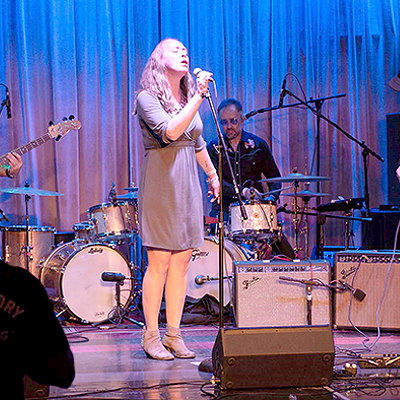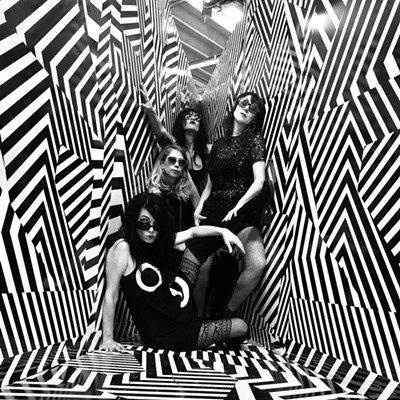The Tuna Helpers will never encounter such a problem. Included in the live performances by this experimental rock trio from Austin, Texas, is a puppet show.
Even though an e-mail message from singer, songwriter and guitarist Adrienne Sneed calls The Tuna Helpers, by way of introduction, "an all-female, puppet-wielding, experimental band," the puppet show plays only a small part in a gig.
At one point in each show, the band members perform as puppets behind a proscenium stage, said Sneed, a former nursery school teacher.
"We are the puppeteers, and the puppets sing some of the songs, and because of that, the songs sort of have sparer instrumentation than our other songs. It's just become another way to express the songs and the emotions behind them. They're definitely songs that I couldn't or wouldn't feel comfortable standing up in front of an audience and singing."
The Tuna Helpers will play at Plush on Saturday, Jan. 28, on their way back home to Austin.
Sneed, 29, spoke with the Weekly from the road somewhere in Ventura County, Calif.; she actually didn't know her exact location. Over the scratchy cell-phone connection, she apologized for sounding a bit woozy.
"I took some codeine last night for my throat. I mean, I took it for my throat and for artistic inspiration. I'm starting to lose my voice, actually, and we've only done two shows on this tour," she said.
Completing the trio are drummer Khattie Quinones, 29, and Adrienne's 24-year-old sister, Bethany Sneed, on keyboards, bells and vocals. Adding to the theatricality of The Tuna Helpers' performances, Bethany also interprets some of the group's songs in American Sign Language.
"Bethany used to do some performances with a deaf choir, where she would sign the songs. It's really beautiful when you see (ASL) performed to a song. That's why I originally asked Bethany to play with us."
The Tuna Helpers' sound is a fascinating blend of psychedelic folk, the music of Kate Bush at her most outré and the Baroque rock stylings of Rasputina.
Charming songs such as "Sea Monster," "Caterpillar "Blueberry Head," "Askew," "Frankenstein," "Haloing Moons" and even "Restraining Order" share a surreal context, dark yet playful, not unlike the fairy tales of E.T.A. Hoffman and Lewis Carroll.
Amid this carnivalesque swirl, Sneed sings in a near-operatic voice and plays jagged-edge guitar. According to reports, she is never still on stage, a whirling dervish acting out the songs with a child's lack of self-consciousness.
The band formed about six years ago, growing out of Sneed's solo act, which was called Adrienne and the Tuna Helpers, so named because the singer would perform flanked by two fish puppets that were her "assistants." She ditched the tuna sidekicks but kept the name when she decided to add human members.
The Tuna Helpers have recorded two albums. Monkeyboy Records released their first CD, The Tuna Helpers Starring in the Suspicious Fish, in 2002.
The beguiling and disarmingly irresistible I'll Have What She's Having came out last year on the Web of Mimicry label, also home to such amazing groups as Secret Chiefs 3, Estradasphere and Sleepytime Gorilla Museum.
Trey Spruance, guitarist of Secret Chiefs 3 and Mr. Bungle fame, produced the recording. Sneed said Spruance mostly encouraged the band members to do what they do, staying out of the way until needed to help manifest the sounds she hears in her head.
"I would say, 'I want this song to sound like creaking wagon wheels or a haunted house with the wind blowing through it.' He knew exactly what I meant, and he helped us create that."
Judging by the eccentricity of the band's songs and arrangements, Sneed's inspirations as she was growing up might seem mild to some experimental rockers.
"Well, I am a big Julie Andrews fan and Barbra Streisand fan, and Maria Callas, too. I love the big showtune singers and opera singers. And then I like Pat Benatar and Heart a lot. And Dolly Parton is another big one for me."
Sneed said that for her songwriting is an experience of self-discovery.
"I write the songs to just figure out how I feel about things, and how I feel about the rest of the world. I guess that's kind of why a lot of musicians write songs," said with a laugh.
The members of The Tuna Helpers also have been pleased over the years to learn that modern rock audiences don't pooh-pooh their puppet-show segment as uncool.
She agreed that part of the puppetry's appeal is that its use in a rock-band context can allow audiences to flash back on childhood experiences in a world of make-believe.
"Everyone's really excited about it when we do it. Sometimes, people in the audience demand more puppet show. But we don't have that many puppet songs. We know how to play our instruments, and we sing and write the songs. We're not using the puppets to cover up any lack of musicianship.
"I'm glad if they feel like it helps them get in touch with inner child, though."
Sneed said she hopes The Tuna Helpers' music touches the listeners in subtle ways, rather than walloping them over the heads with "meaning."
"I want them to hear something that's unique and I would like for them to think, 'This is really special, and I'm glad I got to hear this.'
"I mean, it's not feel-good music, obviously. But it would be nice for them to be happy that there is a lot of heart and soul and guts in the songs. I want them to think, 'Wow, I am glad I got to share that experience with The Tuna Helpers!'"










